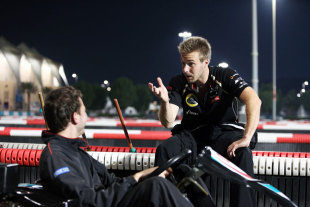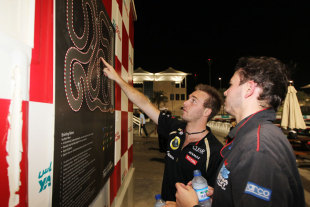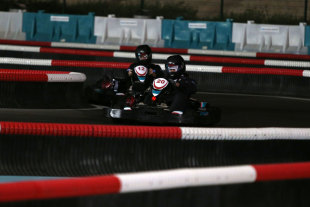
As Romain Grosjean racked up as many needless incidents as impressive performances, a certain triple world champion - Sir Jackie Stewart - offered to coach him. Sir Jackie's business-like brain may have sensed an opportunity, but his 99 grands prix and 27 race wins meant he had plenty of experience to pass on.
The unsurprising response from Grosjean was that he didn't need a driver coach, and it's easy to see why he'd feel that way. Drivers starting out in karts tend to have over 10 years racing experience before they reach Formula One, and while most enjoy a close relationship with their race engineer, they don't take kindly to being told how to drive. Quite simply, the role doesn't exist at the highest level.
But Stewart's offer raises the question; how much is there to be taught when you know how to race? Or at least think you do…
Davide Valsecchi agreed to spend an evening coaching my fairly basic karting skills in order to find out.
When you've just won the GP2 championship and are 36 hours from a day in the race-winning Lotus E20 at the Abu Dhabi Young Driver Test, the last thing you want to be doing is risking injury. So Valsecchi immediately points out that he won't be driving at 100%. "We don't tend to race karts now; you can hurt your ribs easily" he tells me.
The location is the Yas Marina Kart Circuit; a tight and twisty track which takes around a minute to lap in some nippy 390cc Honda four-stroke karts. Valsecchi leads us out of the pit lane and waves me past so he can observe. Naturally, with a top level racing driver behind me, I want to impress.

After five pretty ragged laps, I feel I've acquitted myself quite well but back off to see how the professional does it. Having seen a few different lines in the opening part of the lap, Valsecchi disappears in to the distance through a fast, multi-apex left hander and I'm left in no doubt that I'm some way off. Back in front, I push harder until the end of our first session but errors are becoming common and I park up feeling, in all honesty, a little sick.
"They're quick huh?! In Italy they would be half as fast," are the first words from a beaming Valsecchi. I ask for some feedback and initially think he's sugar coating it.
"You're naturally fast, and very aggressive. Straight from the first lap you really push, which is good. That's not perfect though. At the final corner you were flat on the first lap, I wasn't for two or three but I was faster than you. You lose the rear a bit and as soon as the kart - or any car - starts to slide you lose lots of time. The tyres take a bit to come up to temperature, too."
Then, the honesty: "This corner (pointing to a tight right followed by a hairpin left) you are really shit. You need to get a good exit but you were always slow. Forget the one before, lose time there, you have to. You need the exit of the second corner to be perfect. And the fast left, stay tight, stay tight, stay tight, then the last second go wide for the final apex."
While some feel like obvious statements, others are less so; I question how to carry speed through the final corner.
"Ah, don't just brake," Valsecchi replies, hands outstretched to mimic the pedals. "If you can't stop the rear sliding then keep flat but tap the brake on entry too, just a bit; tap, tap, tap. Not too much or you'll spin. You can do that in other corners too to make it smoother. Keep the kart on the edge. It might feel slow but it's quicker."
Desperate to put this in to practice at the start of the second session, I still don't feel recharged. It's hot - 30C ambient - and I'm gulping water down before being told to stop.
"It'll make you feel bad, like we do if you eat too much at lunch during testing!" Valsecchi says. "You overdrive here. If it's you and your friends, I know you are fastest and you'll enjoy it. You are five seconds quicker than most people here, but because I'm driving you're trying things you can't do and wouldn't usually. Your body is tense and it makes you tired. It's important to know your own limit."

I begin session two with an easy out-lap to regain some composure and then push immediately. Heeding the advice, I sacrifice a lot of speed in one corner for the next and it feels very slow. I then lose the rear in the fast left-hander and have to back out. Lap two, I try again but early on slide wide in to the barrier and allow Valsecchi ahead. One more lap still leaves me feeling ill and I pit.
Valsecchi returns a lap later having extended his advantage over me to 2.3s. When I say I haven't eaten properly for twelve hours he's back in Yoda mode; "If you don't eat you can't do much!
"You were definitely faster on that first lap, much faster until you lost it. Then you crashed, yes? The tyres are not good and you had let them cool."
The flow of information continues and is full of little gems to make up part of what had originally been a 1.5s deficit. Steering inputs, throttle application, eye line, all described and relayed like the most important bit of information I'll ever hear. Having someone on track with you with the knowledge of the whole scenario you're driving in is hugely beneficial on its own, but it's the understanding of the physical and mental state that surprises.
I can't go out again, but I leave with a much deeper appreciation of what goes in to finding that final lap time. I may have improved slightly on my own, but Valsecchi's input fast-tracked the progress and led me to rethink my approach to a lap in a short space of time.
Time is something that few Formula One drivers have, with Grosjean himself having admitted he thought his career was over after just six races in 2008. The sport is all about finding that extra thousandth of a second, and if a driver coach can relay any piece of information based on their own knowledge and experience that could mean finding that 0.001s one lap earlier, surely it's an avenue to be explored.
Chris Medland is assistant editor at ESPNF1
© ESPN Sports Media Ltd.
 Chris Medland is assistant editor at ESPNF1 Chris Medland, who in his youth even found the Pacific GPs entertaining, talked his way in to work at the British Grand Prix and was somehow retained for three years. He also worked on the BBC's F1 output prior to becoming assistant editor ahead of the 2011 season
Chris Medland is assistant editor at ESPNF1 Chris Medland, who in his youth even found the Pacific GPs entertaining, talked his way in to work at the British Grand Prix and was somehow retained for three years. He also worked on the BBC's F1 output prior to becoming assistant editor ahead of the 2011 season

